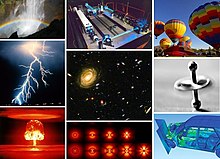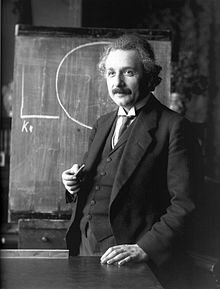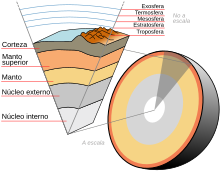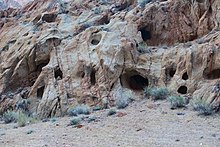Natural Sciences
The natural sciences, natural sciences, physical-natural sciences or experimental sciences (historically called natural philosophy or natural history) are those sciences whose purpose is the study of nature, following the modality of the scientific method known as the empirical-analytical method.
The natural sciences rely on logical reasoning and the methodological apparatus of the formal sciences, especially mathematics and logic, whose relationship with the reality of nature is indirect. Unlike the applied sciences, the natural sciences are part of basic science, but they have their practical developments within them, and they interact with them and with the productive system in the systems called research and development or research, development and innovation (R+D and R+D+I).
Not to be confused with the more restricted concept of Earth sciences or geosciences.
Boundaries between sciences
The differences between the various natural sciences are not always marked, and these "cross sciences" share a large number of fields. Physics plays a significant role in the other natural sciences, giving rise to, for example, astrophysics, geophysics, physical chemistry, and biophysics. Likewise, chemistry is represented by several fields, such as biochemistry, geochemistry and astrochemistry.
A particular example of a scientific discipline that encompasses multiple natural sciences is environmental science. This subject studies the interactions of the physical, chemical and biological components of the environment, with particular attention to the effects of human activity and its impact on biodiversity and sustainability. This science also affects experts from other fields.
A comparable discipline is oceanography, which is related to a wide range of scientific disciplines. Oceanography is further subdivided into other cross-disciplines, such as marine biology. As the marine ecosystem is very large and diverse, marine biology also branches into many subdivisions, including specializations in particular species.
There is also a group of cross-disciplinary fields in which, by the nature of the problems they cover, there are strong currents against specialization. On the other hand, in some fields of comprehensive applications, specialists, in more than one field, have a key role in the dialogue between them. Such comprehensive fields, for example, may include nanoscience, astrobiology, and complex computer systems.
Classical natural sciences
Physics
The physics (from Latin physicaand this of the ancient Greek φυσικός physikós "natural, relative to nature" is the natural science that studies the nature of the most fundamental components and phenomena of the Universe such as energy, matter, force, movement, space-time, physical quantities, physical properties and fundamental interactions.
The scope of physics is extraordinarily broad and may include studies as diverse as quantum mechanics, theoretical physics or optics. Modern physics is geared to growing specialization, where researchers tend to focus particular areas rather than being universalists, such as Albert Einstein or Lev Landau, who worked in a multiplicity of areas.[chuckles]required]
Physics is perhaps the oldest of all academic disciplines, as astronomy is one of its sub-discipline. It also began more than two thousand years ago with the first works of Greek philosophers. In the last two millennia, physics was considered part of what we now call philosophy, chemistry and certain branches of mathematics and biology, but during the scientific revolution in the centuryXVII became a modern science, unique in its own right. However, in some areas such as mathematical physics and quantum chemistry, the limits of physics with other branches of science remain difficult to distinguish. The formulation of theories on the laws governing the Universe has been a central objective of physics since remote times, with the philosophy of the systematic use of quantitative observation and test experiments as a source of verification. The key to the historical development of physics includes milestones such as the law of universal gravitation and the classical mechanics of Newton, the understanding of the nature of electricity and its relation to the magnetism of Faraday the theory of special relativity and the theory of the general relativity of Einstein, the development of the thermodynamics with James Prescott Joule and Sadi Carnot and the model of quantum mechanics with the Schöctor
This discipline encourages competences, methods and a scientific culture that allow us to understand our physical and living world, and then act upon it. Its cognitive processes have become protagonists of knowledge and make general scientific and technological, helping to know, theorize, experience and evaluate acts within various systems, clarifying cause and effect in many phenomena. In this way, physics contributes to the conservation and preservation of resources, facilitating the awareness and effective and sustained participation of society in solving its own problems.[chuckles]required]
Physics is significant and influential, not only because progress in understanding has often been translated into new technologies, but also because new ideas in physics resonate with other sciences, mathematics and philosophy.[chuckles]required]
Physics is not only a theoretical science; it is also an experimental science. Like all science, it seeks that its conclusions can be verifiable through experiments and that the theory can make predictions of future experiments based on previous observations. Given the scope of the field of study of physics, as well as its historical development in relation to other sciences, it can be considered fundamental or central science, since it includes within its field of study chemistry, biology and electronics, as well as explaining its phenomena.
Physics, in their attempt to describe natural phenomena with accuracy and veracity, has reached unthinkable limits: the current knowledge encompasses from the description of microscopic fundamental particles to the birth of stars in the universe and even the power to know with great probability what happened in the early moments of the birth of our universe, to cite a few fields.
Advances in physics often allow advances in new technologies. For example, progress in understanding electromagnetism, solid state physics and nuclear physics led directly to the development of new products that have drastically transformed the current society, such as television, computers, appliances and nuclear weapons; advances in thermodynamics led to the development of industrialization; and advances in mechanics inspired the development of the calculation.Chemistry
Chemistry is the natural science that studies the composition, structure and properties of matter either in the form of elements, species, compounds, mixtures or other substances, as well as the changes they experience during reactions and their relation to chemical energy. Linus Pauling defined it as the science that studies the substances, their structure (types and forms of atom accomodation), their properties and reactions that transform them into other substances in reference with time. Chemistry, through one of its branches known as supramolecular chemistry, is mainly concerned with supratomical groupings, such as gases, molecules, crystals and metals, studying its composition, statistical properties, transformations and reactions, although general chemistry also includes the understanding of the properties and interactions of matter at atomic scale.
Chemistry is often called "central science" for its role of connection in the other natural sciences, relating to physics through physicochemistry, biology through biochemistry, astronomy through astrochemistry, geology through geochemistry, among others. Most chemical processes can be studied directly in the laboratory, using a series of often well-established techniques, both material handling and understanding of the underlying processes. An alternative approach is provided by molecular modeling techniques, which draw conclusions from computer models.
Modern chemistry was developed from alchemy, a proto-scientific practice of an esoteric character, but also experimental, combining elements of chemistry, physics, biology, metallurgy, pharmaceutical, among other disciplines. This phase ends with the chemical revolution, with the discovery of gases by Robert Boyle, the conservation law of matter and the theory of oxygen combustion postulated by the French scientist Antoine Lavoisier. The systematization became apparent with the creation of the periodic table of the elements and the introduction of atomic theory, when the researchers developed a fundamental understanding of the states of matter, ions, chemical links and chemical reactions. Since the first half of the nineteenth century, the development of chemistry has led to the emergence and expansion of a chemical industry of great relevance in the current economy and quality of life.
The disciplines of chemistry are grouped according to the type of matter under study or the type of study performed. Among these are inorganic chemistry, which studies inorganic matter; organic chemistry, which studies organic matter; biochemistry, which studies substances existing in biological organisms; physicochemistry that includes the structural and energetic aspects of chemical systems at macroscopic, molecular and atomic scales, and analytical chemistry, which analyzes samples of matter and tries to understand its composition and structure through various studies and reactions.Astronomy
Astronomy (from the Greek ερον [star] and νομα [nomy] 'norms', 'star laws') is the natural science that studies the celestial bodies of the universe, including stars, planets, their natural satellites, asteroids, comets and meteoroids, interstellar matter, nebulae, dark matter, galaxies, and so also studies the astronomical phenomena linked to them, such as the supernovae, Astronomy also covers the study of the origin, development and final destiny of the Universe as a whole through cosmology, and relates to physics through astrophysics, chemistry with astrochemistry and biology with astrobiology.
Their registration and research of their origin comes from the information that comes from them through electromagnetic radiation or any other medium. Most of the information used by astronomers is collected by remote detection, although it has been possible to reproduce, in some cases, in laboratories, the execution of celestial phenomena, such as, for example, the molecular chemistry of the interstellar medium. It is one of the few sciences in which fans can still play an active role, especially on the discovery and follow-up of phenomena such as variable starlight curves, discovery of asteroids and comets, etc...
Astronomy has been linked to human beings since ancient times and all civilizations have had contact with this science. Characters such as Aristotle, Tales de Mileto, Anaxágoras, Aristarchus de Samos, Hiparco de Nicea, Claudio Ptolomeo, Hipatia de Alexandria, Nicolás Copérnico, Tycho Brahe, Johannes Kepler, Galileo Galilei, Christiaan Huygens or Edmund Halley have been some of their growers. The scientific methodology of this field began to develop in the middle of the centuryXVII. A key factor was the introduction of the telescope by Galileo Galilei, which allowed us to examine the sky of the night in more detail. The mathematical treatment of astronomy began with the development of the celestial mechanics and with the laws of gravitation by Isaac Newton, although it had already been launched by the previous work of astronomers such as Johannes Kepler. Towards the centuryXIX, astronomy had developed as a formal science, with the introduction of instruments such as spectroscope and photography, which allowed the continuous improvement of telescopes and the creation of professional observatories.Geology
Geology (from the Greek γ margin /guê/, 'Earth', and -λογα /- I was./, 'treated') is the natural science that studies the composition and structure both internal and superficial of planet Earth, and the processes by which it has evolved over the course of geological time.
It includes a set of geosciences, which are now known from the point of view of its pedagogy, development and professional application. It offers essential testimonies to understand the tectonic of plates, the history of life through paleontology, and how the evolution of this was, in addition to the climates of the past. Currently, geology is of fundamental importance in the exploration of mineral deposits (mineria) and hydrocarbons (oil and natural gas), and the evaluation of underground water resources (hydrogeology). It is also of fundamental importance in the prevention and understanding of natural phenomena such as mass removal, in general earthquakes, tsunamis, volcanic eruptions, among others. It provides key knowledge in solving environmental pollution problems, and provides information on the climate changes of the past. It also plays an important role in geotechnology and civil engineering.
Geology includes branches such as geophysics, tectonics, structural geology, stratography, historical geology, hydrogeology, geomorphology, petrology and edaphology.
Although mining and precious stones have been the subject of human interest throughout the history of civilization, their scientific development within the science of geology did not occur until the eighteenth century. The study of the Earth, especially paleontology, flourished in the nineteenth century, and the growth of other disciplines, such as geophysics with the theory of tectonic plates in the 1960s, which had an impact on the Earth sciences similar to the theory of evolution on biology.
By extension, it applies to the study of the rest of the bodies and matter of the solar system (astrogeology or planetary geology).Biology
The biology (from the Greek βίος [chuckles]Bíos"life", and -λογα [chuckles]-] "treated", "study" or "science" is the natural science that studies everything related to life and the organic, including the processes, systems, functions, mechanisms or other biological characters underlying living beings in various specialized fields covering their morphology, physiology, physiology, physiology, development, evolution, distribution and interactions in macroscopic and microscopic levels.
Biology deals with both the description of the characteristics and behaviors of individual organisms, as well as the species as a whole, as well as the relationships between living beings and interactions between them and the environment. In this way, it seeks to study the structure and functional dynamics common to all living beings, in order to establish the general laws governing organic life and the principles thereof.
The scale of study ranges from biophysical subcomponents to complex systems, which make up the levels of the biological organization. Modern biology is divided into sub-discipline according to the types of organisms and the scale in which they are studied. For example, molecular biology is the study of the fundamental biomolecules of life, while cell biology has as its object the analysis of the cell, which is the basic constituent unit of all life. At higher levels, anatomy and physiology, for example, study the structure and internal functioning of organisms, respectively, while ecology deals with natural habitats and their relationship with living beings.
The biological fields of botany, zoology and medicine emerged from the first moments of civilization, while microbiology was introduced in the centuryXVII with the discovery of the microscope. However, it was not until the centuryXIX when biology unified, once coincidences were discovered in all living beings and studied as a whole. Some key developments in the science of biology were genetics, the theory of evolution through natural selection, the microbial theory of disease and the application of physics and chemistry techniques at the cell and molecular level, which resulted in biophysics and biochemistry, respectively.
In its modern sense, the word "biology" seems to have been independently introduced by Gottfried Reinhold Treviranus (Götfried Reinhold Treviranus)Biologie oder Philosophie der lebenden Natur, 1802) and Jean-Baptiste Lamarck (Hydrogéologie1802). Generally, it is said that the term was coined in 1800 by Karl Friedrich Burdach, although mentioned in the title of the third volume Philosophiae naturalis sive physicae dogmaticae: Geology, biology, phytology generalis et dendrologiaMichael Christoph Hanow and published in 1766.
The scientist who studies life in general is known as a biologist and can specialize in any branch of this science, although they can also acquire the appeal of their specialty, p. E.g.: zoologist, botanist, microbiologist, geneticist, molecular biologist, etc. However, they are traditionally classified into two large subgroups; laboratory biologists, who normally do lab work; and field biologists, who are usually engaged in field work, although both must have the proper training and fundamental knowledge of both areas in order to be able to carry out their profession.Natural science groups
Physical Sciences
Earth Sciences
Earth's sciences are a set of disciplines whose objective is the study of planet Earth, including its interaction with the rest of the universe and the evolution of living beings living in it. This discipline includes various areas of knowledge, such as: geosciences, atmospheric sciences, marine sciences, environmental sciences, cryospheric sciences, limnology, forest sciences, soil science, physical geography, paleontology, landscape ecology and planetary sciences.
Earth sciences are a tool for planning a rational exploitation of natural resources, understanding the causes of natural phenomena affecting the human being and how it influences nature with its actions.
On the other hand, the Earth sciences allow us to understand the natural processes that have favored and/or threatened the life of man, and their study is linked both to the study of energy flows in nature and to the use of them, and to the prevention of environmental, seismic, meteorological and volcanic risks, among others.
A system is a set of elements that relate and interact with each other. The planet is a complex system whose components tend to balance,[chuckles]required] that is to say that movements in one sense are compensated with others in the reverse sense. Any modification that occurs in any element of the system directly or indirectly affects others.
Geosciences, is equivalent to Earth Sciences and is one of those post-modern terms that have been invented to account for the set of scientific disciplines that build knowledge on Earth, to understand the complex and varied processes involved in evolution, from birth to Planet
Internal processes generate relief, that is, higher or lower places. The external processes deflect the highest reliefs and place in other places the materials produced by this wear or erosion, which maintains the balance of the physical system.
Endogenous or internal processes occur within the Earth as the tectonic of plates. The boundaries between tectonic plates are classified into three types: convergence, divergence and transformative. The movement of tectonic plates can produce orogenesis, formation of mountains, by stacking or deformation of the cortex (plegment and fracture) and phenomena such as earthquakes, magmatism, metamorphism and vulcanism, as well as the creation and destruction of bark.
Exogenous or external processes that develop on the earth's surface involve the transformation of the relief through erosion, which consists of the wear of the earth's surface; the transport of the materials from wear to other areas, and their subsequent accumulation. According to the agent acting, erosion can be classified into: wind, fluvial, marine, rain, glacier, mechanical and antropic.
Life Sciences
Life sciences include all fields of science that study living beings, such as plants, animals and human beings. However, the study of the behavior of organisms, as practiced in ethology and psychology, biology, also covers other fields such as medicine, biomedicine and biochemistry. The methodological spectrum can cover all related devices and devices, including human and social sciences. It has led to a proliferation of specializations and interdisciplinary fields.[chuckles]required]
While biology, medicine and chemistry continue to be life science centres, technological advances in molecular biology and biotechnology have led to a flourishing of new specialties and fields, often interdisciplinary.[chuckles]required]
Life sciences are useful for improving quality and standard of living. They have applications in agriculture, food science, pharmaceutical industries, medicine and health.
In the Anglo-Saxon world, the term is often used life sciences ("sciences of life"). It is not always used in all countries with the same connotations or with the same degree of coverage (context).[chuckles]required]
Contenido relacionado
Arundinella
Antinoria
Agrostis



















